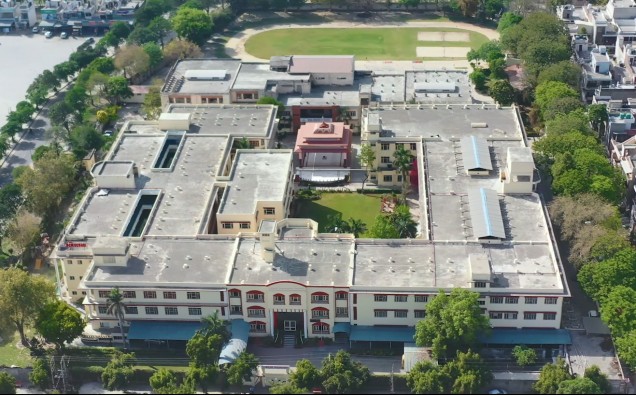A ceremonial plaque has been unveiled at a renovated former school building to mark the first phase of the opening of a ground-breaking business innovation centre in India in a partnership between Birmingham City University (UK) and India’s motorbike and cycle manufacturing giant Hero Group.
Delegates from both organisations gathered to unveil the plaque at the centre in the State of Punjab, which is aimed at driving innovation, creating new businesses and promoting entrepreneurship across the State. Known as the Munjal Birmingham Centre for Innovation and Entrepreneurship (MBCIE), the initiative will provide a place for individuals to take new business ideas, for existing organisations to grow their businesses and for entrepreneurs to collaborate.
The project has seen a former school and teacher training facility converted to serve as a bespoke space providing state-of-the-art facilities, access to expertise and collaborative opportunities for businesses academics and entrepreneurs. Featuring high-tech equipment including 3D printers, Augmented Reality and Virtual Reality tools, the facility aims to meet the needs of changing industries, providing a competitive advantage and new ways of thinking to underpin economic growth in the region and beyond.
MBCIE will serve as an Indian counterpart to Birmingham City University’s new STEAMhouse facility, which places the arts at the heart of the traditional technical subjects of science, technology, engineering and maths to create a STEAM curriculum. Acting as a trade bridge to supporting entrepreneurs and business in both countries in providing a soft platform for market testing and for collaboration, the joint initiative is amongst the first of its kind between UK and India.
MBCIE’s opening saw masterclasses being given to those living and working in the Punjab to allow people to develop new skills and hone existing ones to boost ingenuity and creativity in the business sector. Birmingham City University hopes to be able to run its accredited degree courses from the facility in the future, offering undergraduate students the opportunity to study on an array of STEAM-focused courses.
Professor Julian Beer, Deputy Vice Chancellor (Research, Innovation and Enterprise), at Birmingham City University, said: “Nearly two years ago we set out on an ambitious journey with Hero Group and the Munjal Foundation to establish a centre that would allow businesses to grow and creativity to breed in the thriving State of Punjab.
“It is with great pleasure that we are now able to see the transformation of this building into a significant facility, and the welcoming of the first businesses that will be able to access the facilities and the professional development courses our University will be offering.
“These are the first steps in what we hope will be a long and fruitful relationship as we work hard to make our ambitions to offer STEAM related degrees in the Punjab a reality.”
The plaque was unveiled during a special visit from a Birmingham City University delegation to the Punjab, made up of Vice-Chancellor Professor Philip Plowden, Deputy Vice-Chancellor Professor Julian Beer, Deputy Vice-Chancellor Professor Peter Francis, Assistant Director Bernard Curren, and Senior Development Manager – India Partnerships Makhan Singh.
Punjab is home to around 50,000 Small and Medium Sized Enterprises spread across clusters like Ludhiana, Amritsar, Jalandhar, Mohali, Patiala, Mandi and Gobindgarh.
Many such of these SMEs are reasonably successful and managed by third and fourth generation entrepreneurs, however many of these organisations face technological and innovation related challenges.
The MBCIE aims to bridge this gap and provide a platform to bring organisations together to develop opportunities to discuss and develop ideas, scale up, revisit business models and perform research and development, with the aim of boosting growth and business development.














